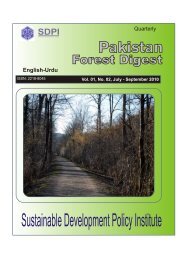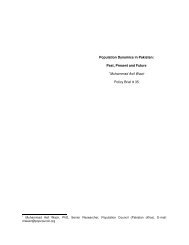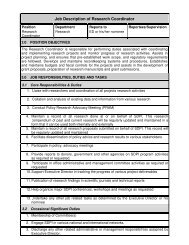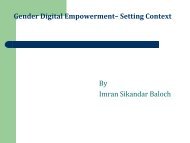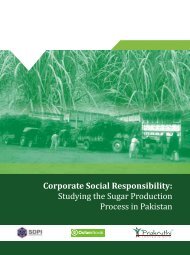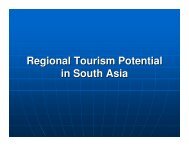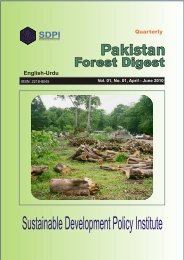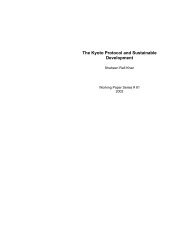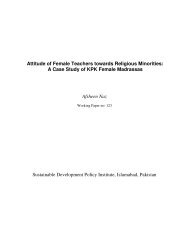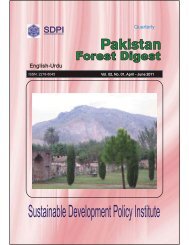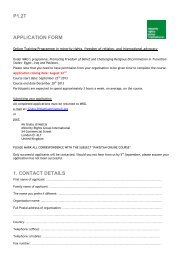Annual Report 2009-10 - Sustainable Development Policy Institute
Annual Report 2009-10 - Sustainable Development Policy Institute
Annual Report 2009-10 - Sustainable Development Policy Institute
- No tags were found...
Create successful ePaper yourself
Turn your PDF publications into a flip-book with our unique Google optimized e-Paper software.
<strong>Annual</strong> <strong>Report</strong><strong>2009</strong> - 20<strong>10</strong>Food SecurityThe term food security reflects the desire to eliminate hunger and malnutrition. The World FoodSummit in 1996 defined food security as, “when all people at all times have physical and economicaccess to sufficient, safe and nutritious food to meet the dietary needs and food preferencesfor an active and healthy life.” This definition implies that food security has three pillars i.e. physical availability of food, socio-economic access to food and food absorption. Provision ofclean drinking water is a must for food absorption. SDPI's stance is that food (in)security shouldbe considered as one of the non-traditional issues. Right to food is one of the basic rights of citizensof Pakistan and one needs to think of food security beyond production & stocks of wheatavailable in Pakistan.Researchers at SDPI have been working on issues of food security and food sovereignty sincethe World Food Summit of 1996. In 2003, SDPI carried out a district ranking of Pakistan on thebasis of food security in collaboration with the UN World Food Program and concluded that37.6% of rural population in Pakistan was food insecure. In <strong>2009</strong>, intensive research was carriedout to determine impacts of global food crisis 2008 on Pakistan's food inflation. It was concludedthat the food crisis in Pakistan was more of a governance crisis and there was very little impactof the global food crisis in Pakistan. Research was carried out to understand food security in theyear 20<strong>10</strong> too. Some of this research is reported under the “Climate Change” section of this report.The flagship research of 20<strong>10</strong> was “Food Insecurity in Pakistan”, ranking of districts ofPakistan on the basis of food insecurity- an update of SDPI's earlier report of 2003, which wascarried out in collaboration with UN World Food Program & Swiss Agency for <strong>Development</strong> &Cooperation.Food Insecurity in Pakistan <strong>2009</strong>Based on a composite index of the above-mentioned pillars of food security, itis observed that the state of food security in Pakistan has deteriorated since2003. The conditions for food security are inadequate in 61 percent districts(80 out of 113 districts) of Pakistan. This is a sharp increase from 2003, whenconditions for food security were inadequate in 45 percent districts (54 out of120 districts) of Pakistan. Almost half of the population of Pakistan (48.6 percent)doesn't have access to sufficient food for an active and healthy life at alltimes.The report comes up with substantial evidence that inter and intra provincialdisparities exist in terms of food security. FATA has the highest percentage offood insecure population (67.7 percent) followed by Balochistan (61.2 percent),Khyber Pakhtunkhwa (KPK) (56.2 percent). The lowest percentage of food insecurepopulation (23.6 percent) is in Islamabad. Among the districts, DeraBugti in Balochistan has the highest percentage of food insecure people(82.4%). Balochistan has the higher number of districts with worst conditionsfor food security. The 20 districts of Pakistan with worst conditions for food security include <strong>10</strong>districts from Balochistan, 5 from FATA; 3 from KPK, and 1 from Gilgit Baltistan (GB) and Sindheach. The number of districts from Balochistan in this category has doubled since 2003. DeraBugti, Musa Khel, Upper Dir, North Waziristan, Kohistan, Muhammand, Dalbadin, South Waziristan,Orakzai, and Panjgur are the <strong>10</strong> districts with worst conditions for food security in Pakistan.It was concluded that the potential militancy-food security nexus cannot be ignored in Pakistanand requires a change in paradigm where food insecurity should not only be treated merely as ahumanitarian issue, but a national security issue.Further information can be obtained from Dr. Abid Suleri. ed@sdpi.org21S u s t a I n a b l e D e v e l o p m e n t P o l I c y I n s t I t u t e



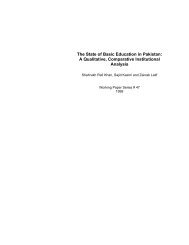
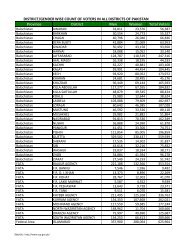
![(October - December, 2010) [13th SDC Special Bulletin]](https://img.yumpu.com/50118608/1/184x260/october-december-2010-13th-sdc-special-bulletin.jpg?quality=85)
